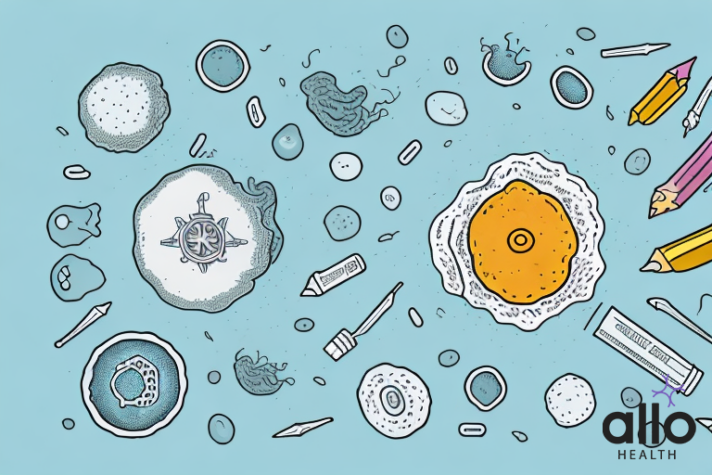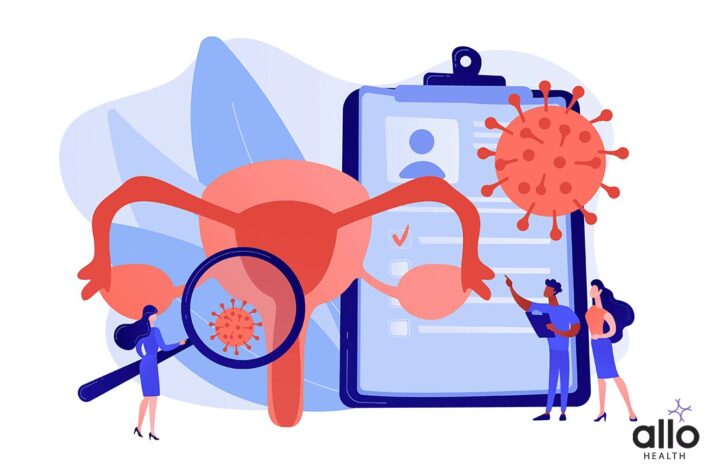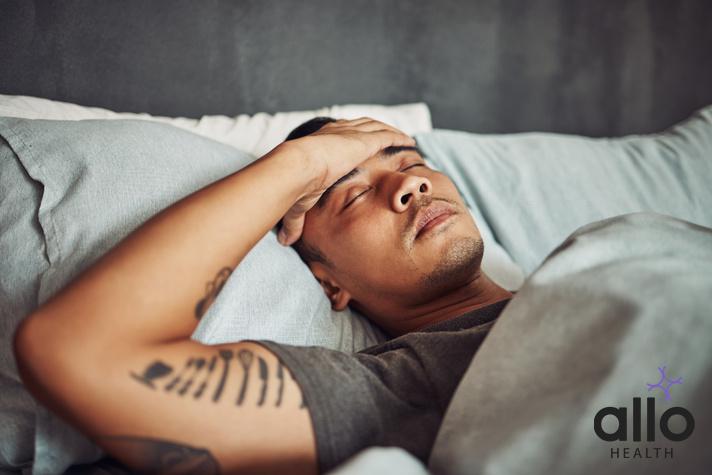10 Home Remedies for Treating Gonorrhea

Allo Health is dedicated to personalized well-being, offering support and trusted information tailored to individual health goals. The platform emphasizes human-generated content, led by a distinguished medical team of experts, including physicians and sexual health specialists. Their commitment to credibility involves rigorous fact-checking, authoritative research, and continuous updates to ensure accurate, up-to-date information. Allo Health's unique approach goes beyond conventional platforms, providing expert-led insights and a continuous commitment to excellence, with user feedback playing a crucial role in shaping the platform's authoritative voice.

Dr Saachi has done her MBBS from Kasturba Medical College, Manipal. She has worked as a research observer in Dept. of microbiology; she also has a keen interest in the human psyche, relationships and Sexual health.
Why This Was Upated?
Our experts continually monitor the health and wellness space, and we update our articles when new information became available.
Updated on 07 March, 2024
- Article was updated as part of our commitment to diversity, equity, and inclusion.

"The following blog article provides general information and insights on various topics. However, it is important to note that the information presented is not intended as professional advice in any specific field or area. The content of this blog is for general educational and informational purposes only.
Book consultation
The content should not be interpreted as endorsement, recommendation, or guarantee of any product, service, or information mentioned. Readers are solely responsible for the decisions and actions they take based on the information provided in this blog. It is essential to exercise individual judgment, critical thinking, and personal responsibility when applying or implementing any information or suggestions discussed in the blog."
Gonorrhea is a sexually transmitted disease (STD) that is caused by the Neisseria gonorrhoeae bacteria. It is contracted through sexual activities such as vaginal, anal, and oral sex with an infected partner. Unfortunately, many people may not realize that they are infected with gonorrhea as symptoms may not be present immediately. This can lead to serious long-term health complications like infertility and pelvic inflammatory disease (PID).
What Is Gonorrhea?
Gonorrhea is a sexually transmitted infection (STI) caused by the bacterium Neisseria gonorrhoeae. It can affect both men and women and is primarily transmitted through unprotected sexual contact, including vaginal, anal, and oral sex with an infected partner. Gonorrhea can also be transmitted from an infected mother to her baby during childbirth.
Causative Agent: Neisseria gonorrhoeae, a bacterium that thrives in warm and moist areas of the reproductive and urinary tract, including the cervix, uterus, fallopian tubes in women, and the urethra in both men and women.
Complications: If left untreated, gonorrhea can lead to serious health concerns, including pelvic inflammatory disease (PID) in women, which can cause infertility and chronic pelvic pain. It can also increase the risk of ectopic pregnancy. In men, untreated gonorrhea may lead to epididymitis, a painful condition affecting the testicles.
Diagnosis: Gonorrhea is typically diagnosed through laboratory testing, which may involve analyzing a urine sample, swabbing the infected area (urethra, cervix, throat, or rectum), or using other molecular diagnostic methods.
Partner Notification: If diagnosed with gonorrhea, it is essential to inform sexual partners so that they can be tested and treated if necessary, helping to prevent the further spread of the infection.
Gonorrhea is a common STI, and anyone who is sexually active can be at risk. Seeking prompt medical attention, practicing safe sex, and getting regular STI screenings are essential for maintaining sexual health and preventing the spread of infections.
Gonorrhea Symptoms
Gonorrhea symptoms can vary and may not always be apparent, particularly in the early stages of infection. Some individuals infected with gonorrhea may not show any symptoms at all. But, when symptoms do occur, they can affect different parts of the body, depending on the site of infection. Here are the symptoms associated with gonorrhea:
Genital Symptoms:
- Men:
- Pain or a burning sensation during urination.
- White, yellow, or greenish discharge from the penis.
- Swelling or redness at the opening of the penis.
- Pain or discomfort in the testicles.
- Women:
- Pain or a burning sensation during urination.
- Increased vaginal discharge that may be yellowish or greenish.
- Vaginal bleeding between menstrual periods.
- Pelvic pain or discomfort, particularly during sexual intercourse.
- Abdominal pain.
Rectal Symptoms:
- Gonorrhea can infect the rectum, especially in individuals who engage in anal sex.
- Rectal pain or discomfort.
- Discharge or bleeding from the rectum.
- Anal itching.
Throat Symptoms:
- Gonorrhea can infect the throat, commonly in individuals who engage in oral sex.
- Sore throat.
- Difficulty swallowing.
- Swollen lymph nodes in the neck.
Conjunctivitis:
- In rare cases, gonorrhea can cause conjunctivitis (pink eye) when the eyes come into contact with infected genital fluids.
- Redness of the eyes.
- Discharge from the eyes.

It is crucial to note that some individuals infected with gonorrhea may not experience any noticeable symptoms, particularly in the early stages. As a result, routine testing for sexually transmitted infections, especially in individuals with multiple sexual partners or those engaging in unprotected sex, is essential for early detection and treatment.
Prompt medical attention is crucial if you suspect you may have gonorrhea or if you experience any symptoms associated with the infection. Early diagnosis and treatment not only help alleviate symptoms but also prevent complications and reduce the risk of spreading the infection to others. If you suspect you have been exposed to gonorrhea or are experiencing symptoms, it is recommended to consult a healthcare professional for testing and appropriate management.
Gonorrhea Causes
Gonorrhea is caused by the bacterium Neisseria gonorrhoeae. The infection is primarily transmitted through direct, unprotected sexual contact with an infected person. Here are the key details about the causes of gonorrhea:
- Neisseria Gonorrhoeae Bacterium: The specific bacterium responsible for gonorrhea is Neisseria gonorrhoeae. It is a gram-negative bacterium that infects the mucous membranes of the reproductive and urinary tract, as well as the rectum, throat, and eyes.
- Transmission: Gonorrhea is mainly transmitted through sexual activities, including vaginal, anal, and oral sex with an infected partner. The bacterium thrives in warm and moist areas of the reproductive and urinary tracts, making these regions susceptible to infection.
- Modes of Transmission:
- Vaginal and Anal Sex: Transmission is most common through vaginal and anal sex when there is direct contact with infected genital secretions.
- Oral Sex: Gonorrhea can be transmitted through oral sex when there is contact with infected genital, anal, or throat secretions.
- Childbirth: Infected mothers can pass gonorrhea to their newborns during childbirth, leading to eye infections in the baby.
- Asymptomatic Carriers: Some individuals infected with Neisseria gonorrhoeae may not experience any symptoms (asymptomatic carriers) but can still transmit the infection to their sexual partners. This makes routine testing and safe sexual practices crucial for prevention.
- Increased Risk Factors:
- Certain factors increase the risk of contracting gonorrhea, including:
- Multiple sexual partners.
- Unprotected sexual activity.
- Having a history of sexually transmitted infections (STIs).
- Engaging in high-risk sexual behaviors.
- Certain factors increase the risk of contracting gonorrhea, including:
- Antibiotic Resistance: Neisseria gonorrhoeae has shown a concerning ability to develop resistance to antibiotics, which poses challenges for treatment. It underscores the importance of responsible antibiotic use, completing prescribed treatment courses, and regular monitoring for emerging resistant strains.
Given the nature of the infection, practicing safe sex, using barrier methods like condoms consistently and correctly, and getting regular STI screenings are crucial for preventing the transmission of gonorrhea. Early diagnosis and treatment are essential for managing the infection effectively and preventing complications. If someone suspects they may have been exposed to gonorrhea or is experiencing symptoms, seeking prompt medical attention for testing and appropriate care is advisable.
Gonorrhea Treatment
The treatment of gonorrhea involves the use of antibiotics to eliminate the Neisseria gonorrhoeae bacterium. But, due to the increasing prevalence of antibiotic-resistant strains, it is important to consult with a healthcare professional to determine the most effective antibiotic regimen. Here are the key details about gonorrhea treatment:
- Antibiotics: Commonly prescribed antibiotics for gonorrhea include ceftriaxone, often in combination with azithromycin or doxycycline. Due to the emergence of antibiotic-resistant strains, the choice of antibiotics may vary based on local resistance patterns and individual patient factors.
- Combination Therapy: Combination therapy with two different antibiotics is often recommended to improve effectiveness and reduce the risk of developing antibiotic resistance. The combination of ceftriaxone and azithromycin is a commonly used regimen.
- Single-Dose Treatment: In many cases, treatment is administered as a single dose, especially for injectable antibiotics like ceftriaxone. This ensures compliance and helps prevent the development of resistance.
- Follow-Up Testing: After completing the prescribed antibiotic treatment, it is crucial to undergo follow-up testing to confirm that the infection has been successfully eradicated. This helps ensure that any remaining bacteria are treated promptly.
- Partner Treatment: Sexual partners of individuals diagnosed with gonorrhea should also be tested and treated to prevent reinfection and reduce the risk of further transmission. This is typically recommended even if the partner is asymptomatic.
- Preventing Reinfection: Individuals treated for gonorrhea should abstain from sexual activity until they have completed the entire course of antibiotics and received confirmation of successful treatment. It’s also important to notify recent sexual partners so they can seek testing and treatment.
- Drug Resistance Challenges: Neisseria gonorrhoeae has shown an alarming ability to develop resistance to antibiotics over time. Therefore, healthcare providers must stay informed about local resistance patterns and adjust treatment regimens accordingly.
- Pregnancy Considerations: Pregnant women with gonorrhea may be treated with antibiotics that are safe during pregnancy. But, healthcare providers need to consider the potential impact on the developing fetus.
- Adherence to Treatment: Adherence to the prescribed treatment regimen is crucial for successful eradication of the infection. Skipping doses or not completing the full course of antibiotics can contribute to treatment failure and the development of antibiotic-resistant strains.
- Rescreening: Individuals treated for gonorrhea should be rescreened for other sexually transmitted infections, as coinfection is common. Additionally, regular testing for gonorrhea and other STIs is advisable for those at increased risk.
Self-medication or using leftover antibiotics is not recommended. Consultation with a healthcare professional is necessary to determine the appropriate antibiotics based on the individual’s health status, antibiotic resistance patterns, and other factors. Early diagnosis, prompt treatment, and preventive measures are crucial for managing gonorrhea effectively and preventing complications.
10 Home Remedies for Treating Gonorrhea

Gonorrhea is a bacterial infection, and while home remedies may provide relief for some symptoms, they are not a substitute for professional medical treatment with antibiotics. Antibiotics prescribed by a healthcare professional are the primary and most effective way to treat gonorrhea. But, here are some home care tips that may help manage symptoms and support overall health during and after antibiotic treatment:
- Rest: Getting plenty of rest allows the body to focus on healing and can help boost the immune system’s response to the infection.
- Hydration: Drinking plenty of fluids, such as water and herbal teas, can help prevent dehydration and support overall health. It’s essential to stay hydrated, especially if experiencing fever or discomfort.
- Warm Compress: Applying a warm compress to the affected area (such as the genital or pelvic region) can help alleviate pain and reduce inflammation.
- Pain Relief: Over-the-counter pain relievers, such as acetaminophen or ibuprofen, may help manage pain and reduce fever. But, it’s important to follow recommended dosages and consult with a healthcare professional if there are concerns.
- Avoiding Irritants: Avoid using harsh soaps, lotions, or other irritants in the genital area. Opt for gentle, fragrance-free products to prevent further irritation.
- Comfortable Clothing: Wear loose-fitting and breathable clothing to minimize irritation and promote comfort, especially in the genital area.
- Probiotics: Probiotics, either through supplements or fermented foods like yogurt, may help restore and maintain a healthy balance of beneficial bacteria in the digestive system. But, their role in treating gonorrhea specifically is limited.
- Healthy Diet: Consuming a nutritious and balanced diet can support overall health and aid in recovery. Include foods rich in vitamins and minerals to boost the immune system.
- Good Hygiene Practices: Practicing good hygiene, such as regular bathing and gentle cleansing of the genital area, can help prevent additional complications and discomfort.
- Abstaining from Sexual Activity: Abstaining from sexual activity, including vaginal, anal, and oral sex, during the course of antibiotic treatment is crucial to prevent the spread of the infection and allow for complete healing.
These home care tips are supportive measures and do not replace professional medical treatment with antibiotics. If you suspect you have gonorrhea or are experiencing symptoms, it is essential to seek prompt medical attention for testing, diagnosis, and appropriate treatment. Consulting with a healthcare professional ensures that the infection is effectively addressed, complications are minimized, and the risk of spreading the infection is reduced.
Gonorrhea Prevention
Preventing gonorrhea involves adopting safe sexual practices, maintaining open communication with sexual partners, and seeking regular testing for sexually transmitted infections (STIs). Here are detailed measures for gonorrhea prevention:
- Abstinence or Mutual Monogamy: Abstaining from sexual activity is the most effective way to prevent gonorrhea. Alternatively, being in a mutually monogamous relationship with a partner who has been tested and is not infected with gonorrhea or other STIs can reduce the risk of transmission.
- Consistent and Correct Condom Use: Consistently and correctly using latex or polyurethane condoms during vaginal, anal, and oral sex can significantly reduce the risk of gonorrhea transmission. Condoms create a barrier that prevents contact with infected genital secretions.
- Regular STI Testing: Individuals who are sexually active, especially those with multiple partners or engaging in high-risk sexual behaviors, should undergo regular testing for STIs, including gonorrhea. Early detection allows for prompt treatment and helps prevent complications.
- Open Communication: Open and honest communication with sexual partners about sexual health is crucial. Discussing STI testing, sharing test results, and jointly deciding on preventive measures can contribute to a healthier sexual relationship.
- Pre-Exposure Prophylaxis (PrEP): PrEP is a preventive measure for individuals at high risk of HIV infection. While it does not protect against gonorrhea, it may be considered for those at risk of multiple STIs. But, it is not a substitute for condoms and regular STI testing.
- Reducing Sexual Partners: Limiting the number of sexual partners can reduce the risk of exposure to STIs, including gonorrhea. Being selective and cautious about sexual partners can contribute to overall sexual health.
- Vaccination: Currently, there is no vaccine specifically for gonorrhea. But, vaccination against other STIs, such as human papillomavirus (HPV), can reduce the overall risk of infection.
- Prompt Treatment and Partner Notification: If diagnosed with gonorrhea or any other STI, seeking prompt medical attention and completing the prescribed treatment are crucial. Additionally, notifying recent sexual partners allows them to get tested and treated, preventing further transmission.
- Avoiding Unprotected Oral Sex: While condoms provide protection during vaginal and anal sex, they may not offer complete protection during oral sex. Limiting the number of sexual partners and discussing preventive measures with a healthcare professional can be beneficial.
- Regular Health Checkups: Routine health checkups, including sexual health screenings, are important for overall well-being. Regular visits to a healthcare provider allow for the monitoring of sexual health and the identification of potential risks.
It’s essential to note that gonorrhea prevention involves a combination of strategies, and individuals should tailor their approach based on their sexual activity, relationship status, and personal circumstances. Open communication, responsible sexual behavior, and regular healthcare visits contribute to a comprehensive approach to preventing gonorrhea and other STIs.
Most Asked Questions
-
Can home remedies cure gonorrhea?
Home remedies cannot cure gonorrhea. Antibiotics prescribed by a healthcare professional are the most effective way to treat this bacterial infection. Home remedies may provide relief for some symptoms, but they do not address the underlying infection. Seeking prompt medical attention and completing the prescribed antibiotic treatment is crucial to eradicate the Neisseria gonorrhoeae bacterium and prevent complications.
-
Are there specific home remedies for gonorrhea symptoms?
While home remedies may help manage symptoms, it's essential to remember they do not treat the infection itself. Warm compresses, over-the-counter pain relievers, and maintaining good hygiene can alleviate discomfort. But, these measures are supportive and should not replace professional medical care. Consult with a healthcare professional for appropriate diagnosis and treatment.
-
Can probiotics help with gonorrhea treatment at home?
Probiotics, found in supplements or fermented foods like yogurt, may contribute to overall health but are not a direct treatment for gonorrhea. Antibiotics prescribed by a healthcare professional are necessary to eliminate the Neisseria gonorrhoeae bacterium. Probiotics can be included as part of a healthy diet but should not replace medical treatment.
-
Is it advisable to self-treat gonorrhea with leftover antibiotics?
Self-treatment with leftover antibiotics is not advisable. Incomplete or inappropriate antibiotic use can contribute to antibiotic resistance and treatment failure. It is essential to consult with a healthcare professional for a proper diagnosis, antibiotic prescription, and guidance on completing the full course of treatment.
-
Can home remedies prevent gonorrhea?
Home remedies cannot prevent gonorrhea. The most effective preventive measures include practicing safe sex with consistent and correct condom use, limiting sexual partners, and regular STI testing. Open communication with sexual partners, vaccination against other STIs, and seeking prompt medical attention for testing and treatment contribute to overall sexual health.






































